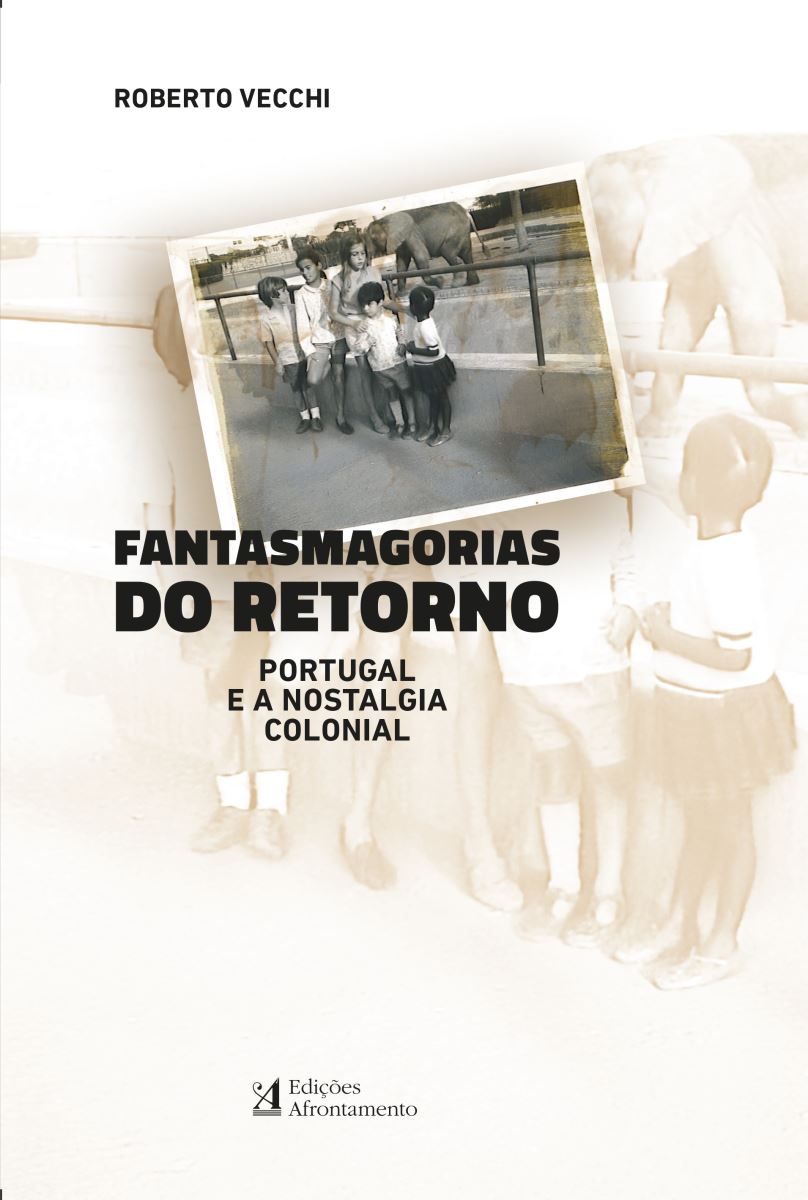
FANTASMAGORIAS DO RETORNO - Portugal e a Nostalgia Colonial
Roberto Vecchi
2025 | Porto : Edições Afrontamento | Memoirs
A nostalgia, ou seja, a possibilidade de repensar um passado sem culpas, é um traço dominante da nossa modernidade. É um modo de reusar e de refazer o passado. A experiência de Portugal em África deixou - com traços hoje evidentíssimos - uma difusa constelação de sentimentos nostálgicos do passado colonial. A nostalgia colonial de África é uma herança vistosa no presente e nas produções culturais contemporâneas. Pelas tangências com outros sentimentos como a perda, a melancolia, mas sobretudo, no caso de Portugal, a saudade, a nostalgia proporciona materiais fundamentais para o imaginário português contemporâneo (literatura, cinema, artes plásticas, teatro) e para a construção de uma memória pública. Portugal alimenta e reforça uma fantasmagoria do retorno em relação ao passado africano, que encontra, também nas comunidades da internet, um repertório de lugares de contemplação, revisão e, reencantamento do passado, contribuindo amplamente para a formação de vastas e idealizadas memórias e pós-memórias coloniais. Mas será possível resgatar a nostalgia do seu conservadorismo ontológico e torná-la, através de uma revisão radical, uma forma de construção do futuro?
Imagem de capa: Arquivo familiar
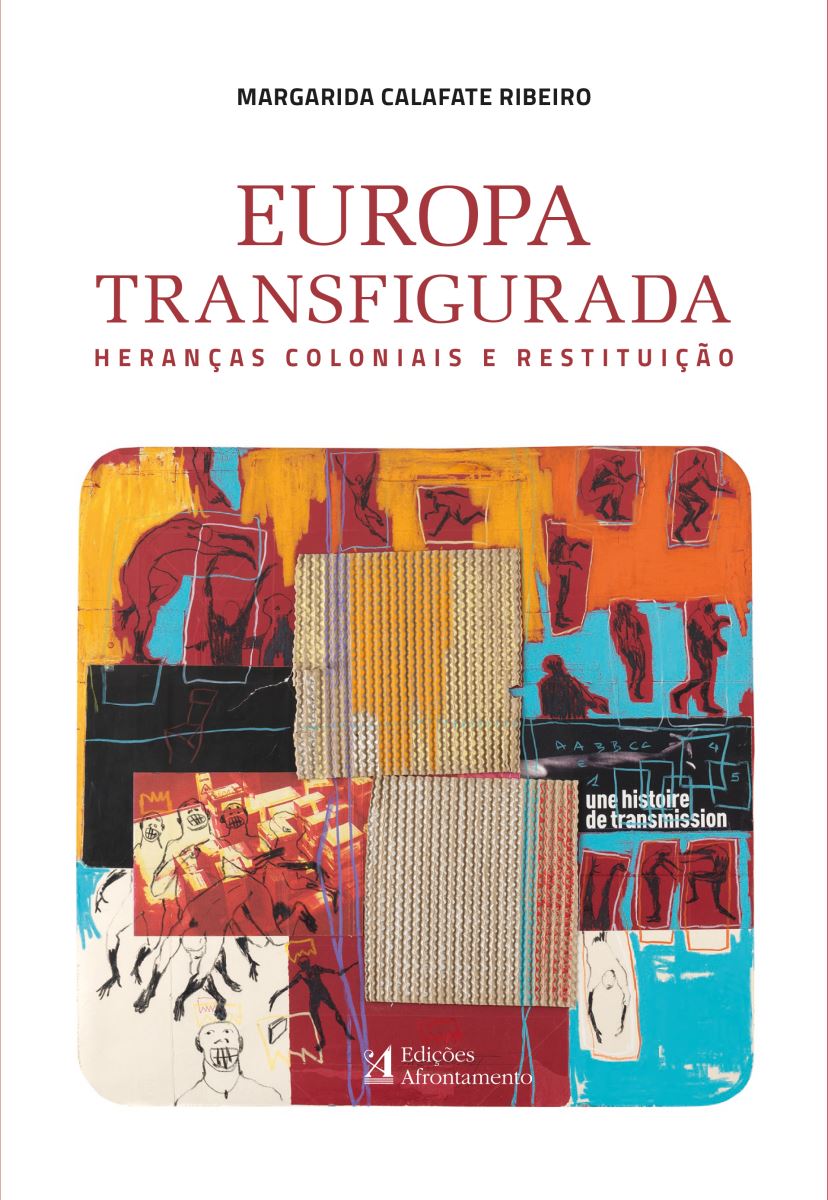
Europa Transfigurada - Heranças Coloniais e Restituição
Margarida Calafate Ribeiro
2025 | Porto : Edições Afrontamento | Memoirs
This book discusses present-day Europe: the people, the politics, the history, the memory, the literature, and the contemporary artistic productions. It places post-colonial studies and memory studies side by side, two interdisciplinary areas par excellence in which the call to various networked disciplines is essential to understanding the complexity of the phenomena in question. It focuses in particular on three European areas - Portugal, France, and Belgium, and takes a comparative approach to the colonial wars in France and Portugal, the decolonisation movements, and the transitions in Europe from a colonising continent to a post-colonial space triggered by these movements. It questions these legacies in contemporary Europe and their transfiguration through social, political, and artistic means.
Cover image: Nú Barreto, Separação, 2024. Fotografia: Atelier 80, Paris.
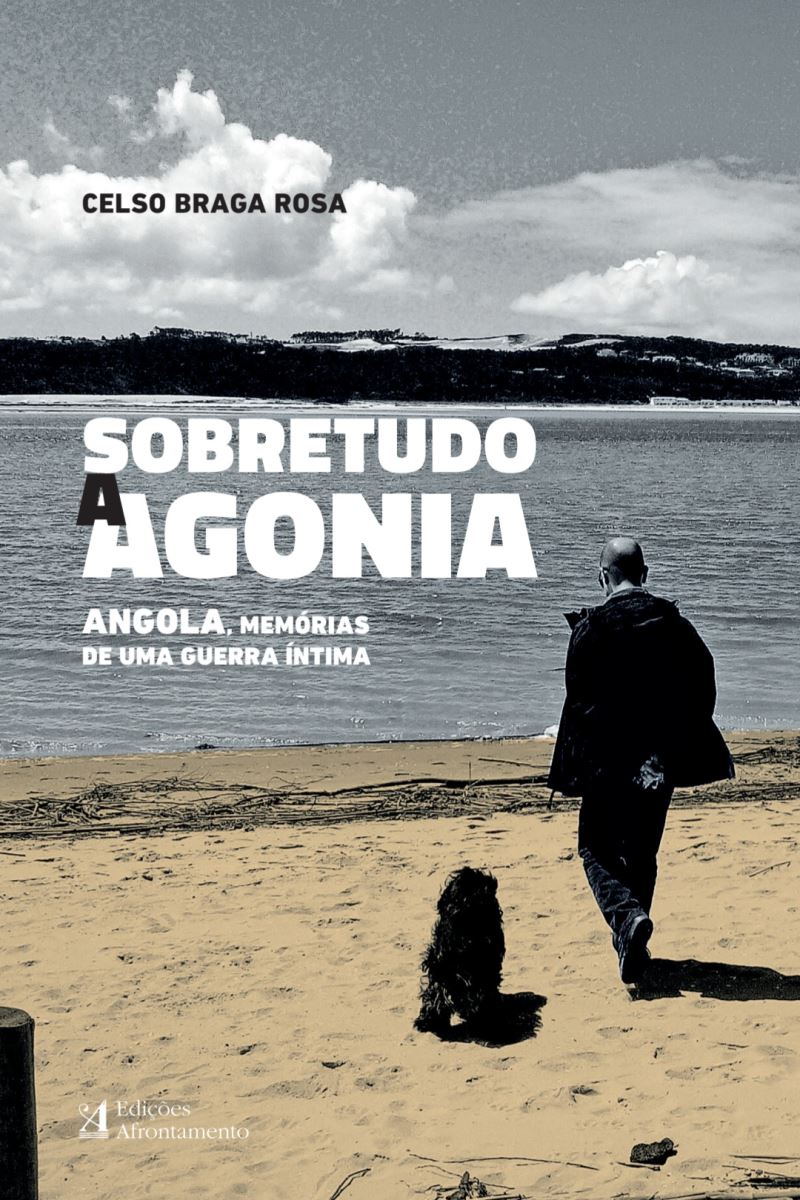
SOBRETUDO A AGONIA - Angola: Memórias de uma Guerra Íntima
Celso Braga Rosa
2025 | Porto : Edições Afrontamento | Memoirs
Ao longo dos anos fui tomando contacto com livros, filmes e músicas que foram funcionando como um cheiro que activava em mim memórias órfãs de Angola e de conflitos familiares. Filho de um ex-combatente do exército colonial português, nasci em 1973 numa Angola em guerra que abandonaria pouco tempo depois, em Janeiro de 1976, e uma fatia significativa do meu passado são silêncios e ausências. Por isso mesmo, em palavras alheias fui-me descobrindo como se através delas pudesse recuperar uma memória desse meu passado difuso de um modo mais coerente e rico do que se me esforçasse por fazê-lo sozinho. A verdade é que em palavras que não são minhas descobri também a minha voz, resultando este livro numa manta de retalhos entre aquilo de que tenho memória, as memórias de família que me foram transmitidas, e as memórias de tantos que escreveram sobre a guerra nesta ex-colónia portuguesa com pinceladas tão tangentes com o meu passado. No fim, deste exercício de construção de uma memória de guerra particular restaram ainda alguns silêncios incomodativos. Muitos desses decidi preenchê-los com a imaginação, porque acredito que aquilo que eu ficcionar hoje será, hoje ainda, uma parte da minha memória tão real quanto qualquer outra. Outros optei por esquecê-los em definitivo, porque água de são também as lágrimas caladas de quem tem memória.
Imagem de capa: Edições Afrontamento, Lda.
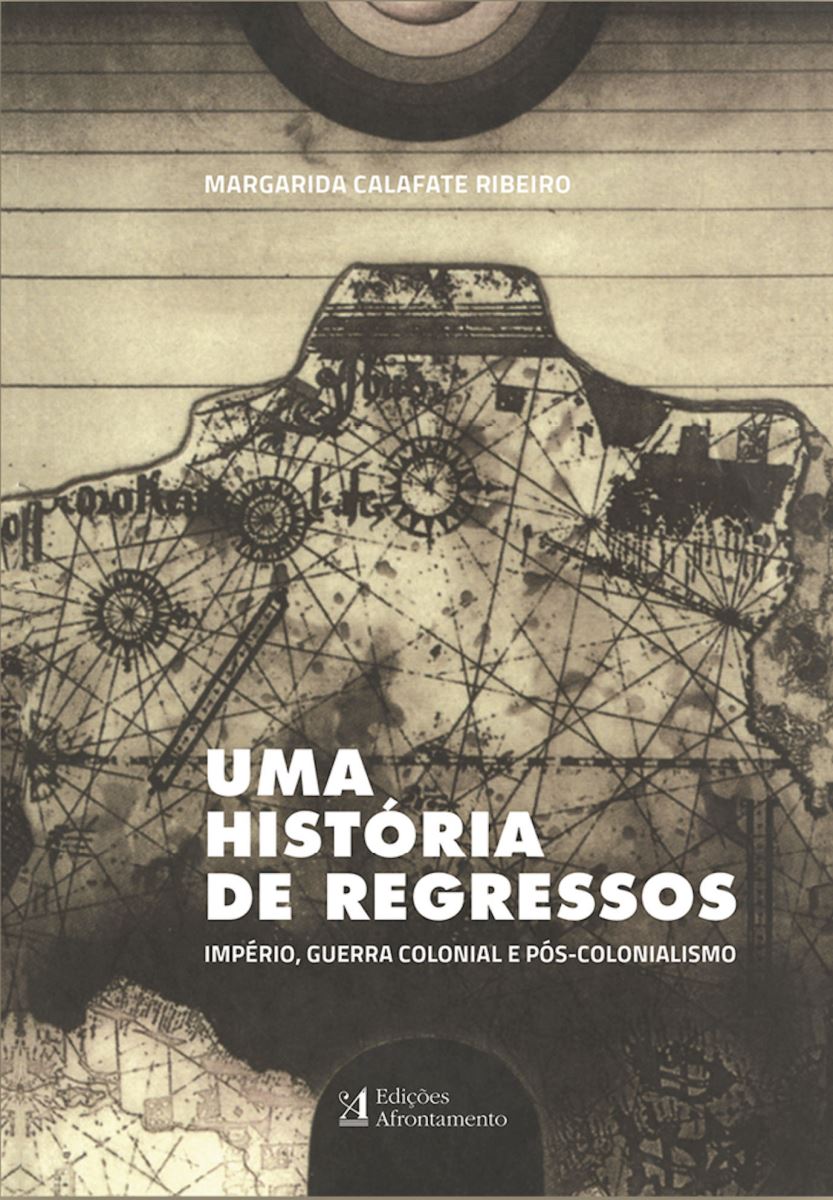
Uma História de Regressos- Império, Guerra Colonial, Pós-Colonialismo
Margarida Calafate Ribeiro
2024 | Porto : Edições Afrontamento | Memoirs
Uma História de Regressos- Império, Guerra Colonial, Pós-Colonialismo, primeiro publicado em Portugal em 2004 e parcialmente em inglês na revista Portuguese Studies, tornou-se, desde logo, numa das mais relevantes referências nos estudos pós-coloniais, abrindo novas linhas de investigação sobre a memória dos impérios na sociedade portuguesa contemporânea e nas suas representações literárias e históricas.
Ao propor uma leitura da relação simbólica de Portugal com o império africano a partir de uma análise detalhada de textos literários e políticos - bem como da ideia de haver uma "imaginação do centro" formulada por Boaventura de Sousa Santos e do pensamento de Eduardo Lourenço sobre a identidade portuguesa - o livro redimensiona o tópico clássico de translatio imperii no contexto do que genericamente tem sido designado como estudos pós-coloniais, levando ao seu inovador conceito condutor: "o império como imaginação do centro".
Imagem de capa: Bartolomeu Cid dos Santos, Parts of Africa, 1970
COMPRAR BOOK REVIEW
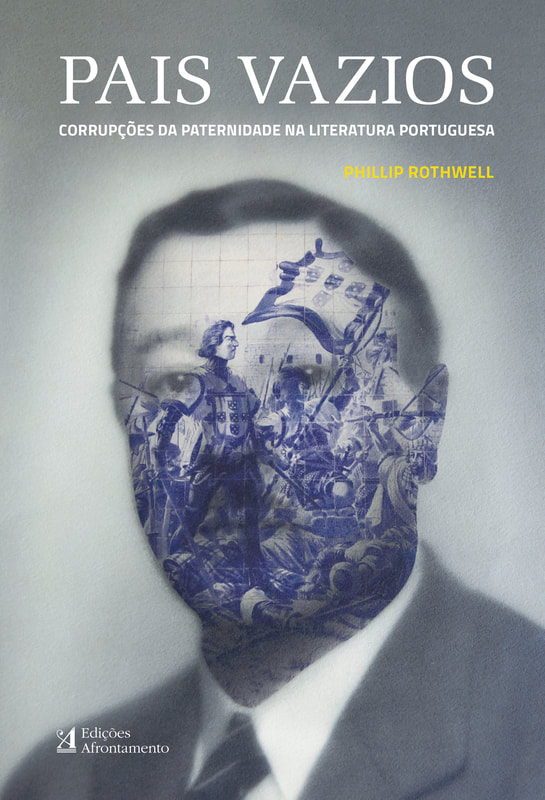
Pais Vazios. Corrupções da paternidade na literatura portuguesa
Phillip Rotwell
2023 | Porto : Edições Afrontamento | Memoirs
Pais Vazios analisa a peculiar e recorrente mobilização da figura paterna em textos literários portugueses desde o início do século XIX até ao presente. Neste volume, Phillip Rothwell defende a existência de uma tendência especificamente portuguesa para o que denomina a «paternidade vazia» – uma corrupção da função paterna lacaniana que desde o século XV tem continuamente aflorado na cultura portuguesa. Salientando os padrões de receção de figuras históricas como o Infante D. Henrique, D. Sebastião, Sidónio Pais e Salazar, Rothwell oferece um conjunto de inovadoras leituras de textos de Eça de Queirós, Almeida Garrett, Helder Macedo, António Lobo Antunes, José Régio, Gomes de Amorim, José Cardoso Pires e António Ferro. Rothwell revela como a contradição de uma paternidade assexuada que opera no âmbito nacional não é mais do que a faceta de uma função paterna desenfreada cujas demais deturpações implicam, em certas ocasiões, uma proibição excessiva e, noutras, a igualmente opressiva obrigação de fruir. O AUTOR. Philip Rothwell é professor catedrático de português, Cátedra Dom João II, na Faculdade de Línguas Medievais e Modernas, Universidade de Oxford. Especialista em literaturas e culturas de Portugal e da África Lusófona, é hoje uma referência nos estudos sobre o escritor moçambicano Mia Couto e sobre o autor angolano Pepetela. A sua investigação atual debruça-se sobre as escritoras no espaço literário angolano. É autor de Pepetela and the MPLA: The Ethical Evolution of a Revolutionary Writer e Leituras de Mia Couto: aspetos de um pós-modernismo moçambicano.
Imagem de capa: Márcio de Carvalho, série The Era of Involuntary Memory, 2020 (cortesia do artista)
COMPRAR BOOK REVIEW
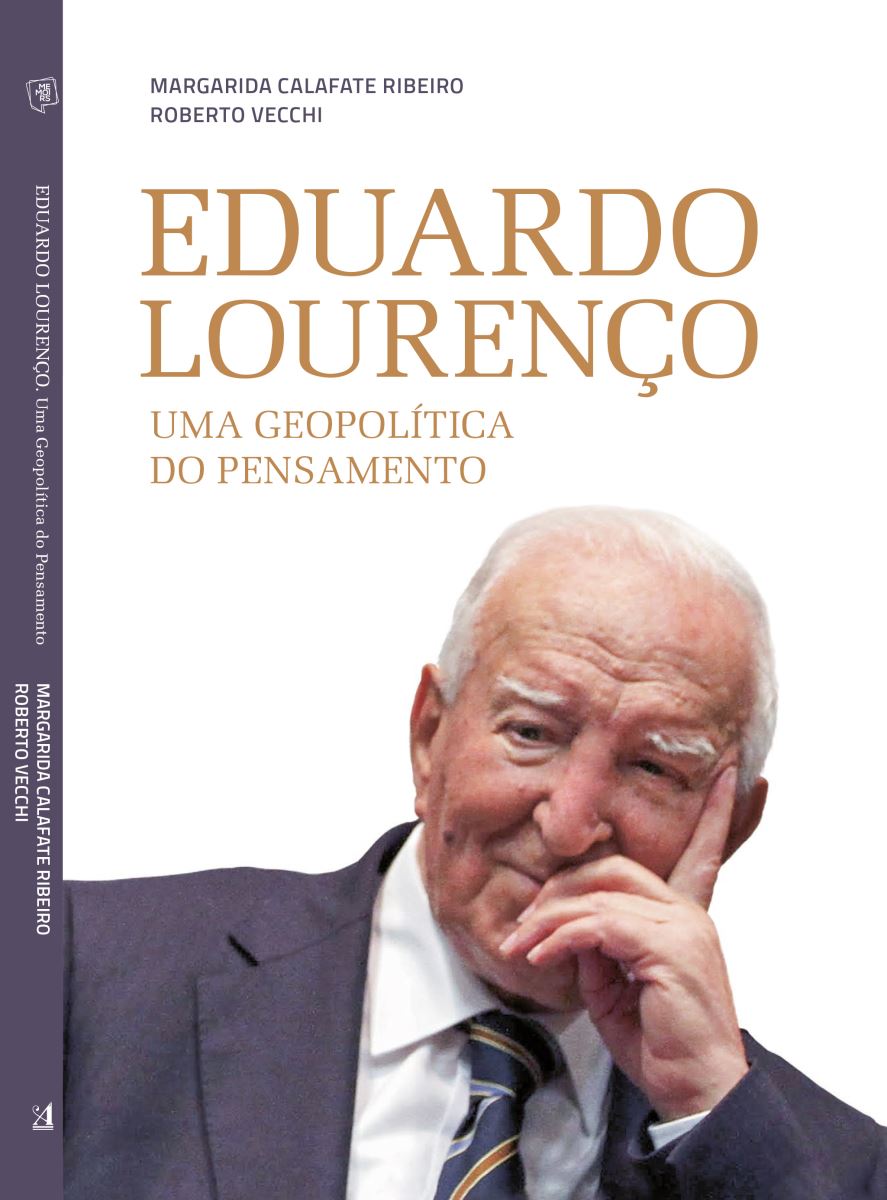
EDUARDO LOURENÇO. UMA GEOPOLÍTICA DO PENSAMENTO
Margarida Calafate Ribeiro | Roberto Vecchi
2023 | Porto : Edições Afrontamento | Memoirs
A escrita de Eduardo Lourenço, a sua arte do pensamento, exige uma capacidade de leitura não primária ou estereotipada, reivindica uma epistemologia adequada. Não interessa de onde vem, mas tem de ser rigorosa. O paradoxo (ou a dificuldade) é que a heterodoxia enquanto texto, mesmo que indisciplinada, impõe uma disciplina de leitura sofisticada.
Com este pequeno contributo para a construção de uma “geopolítica do pensamento” de Eduardo Lourenço, queremos mostrar que a herança do ensaísta é essa: ler a obra com o cuidado, com a inteligência, com o entendimento do jogo subtil de deslocação dos sentidos, lê-la e, a partir dela, pensar.
Imagem de capa: Foto de Nuno Simão Gonçalves
COMPRAR
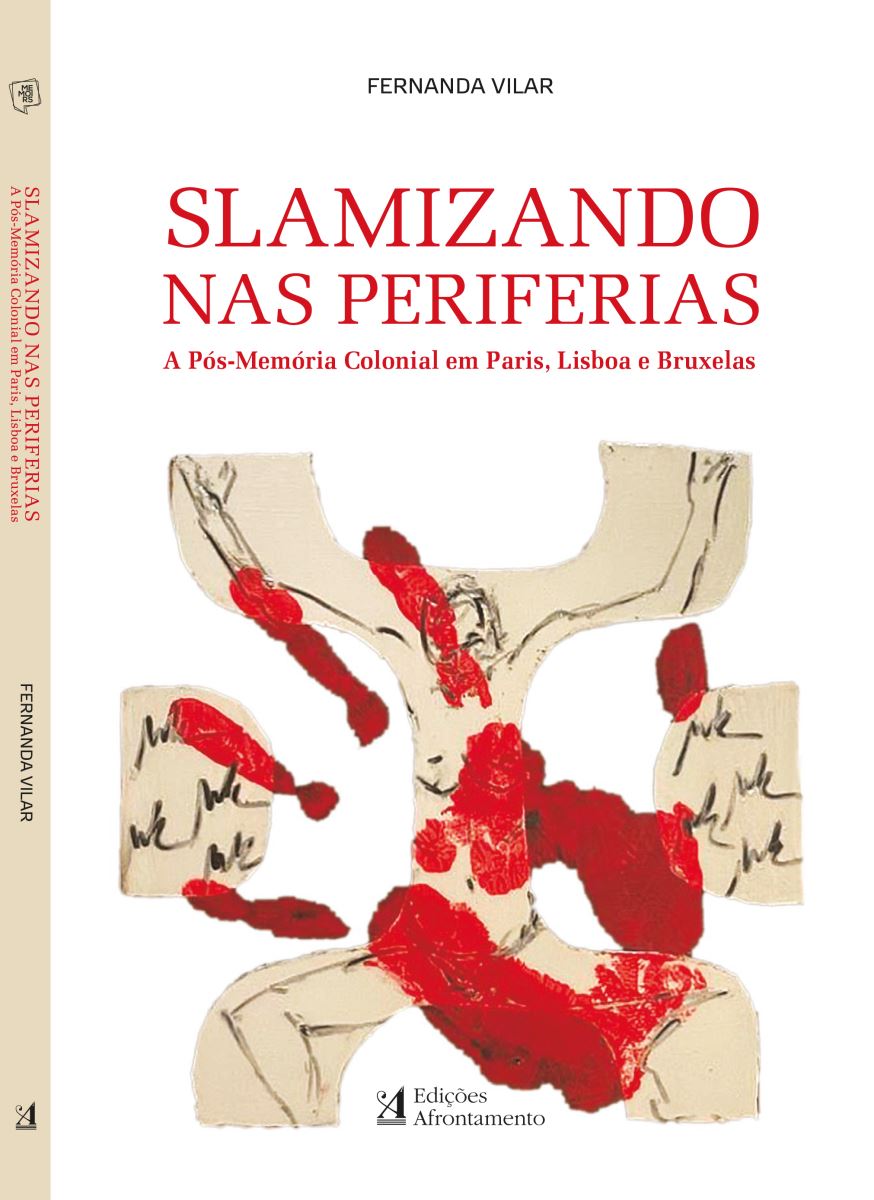
Slamizando nas periferias. A Pós-Memória Colonial em Paris, Lisboa e Bruxelas
Fernanda Vilar
2022 | Porto : Edições Afrontamento | Memoirs
The artistic expressions of the peripheries are an important part of the cultural scene in the big European capitals, hip-hop being one of the fundamental movements that have emerged from this. The slam poetry competition is part of this scene and offers artists the possibility to "take the stage" and express themselves. In this book, I study slam poetry that addresses the transmission of the memory of colonisation through poetry, enabling the understanding and definition of a multiple and fluid identity of subjects inheriting from a French, Belgian and Portuguese colonial past. The analysis of the chosen poems allows us to understand that there are no colonial exceptionalisms and that the traumas and wounds that exist to this day have a common cause, the condition of being colonised, which is perpetuated to this day in post-colonial societal relations. Each poem is an expression of the urgency to decolonise in order to better live our differences in an increasingly cosmopolitan world.
Cover image: Dominique Barbot, Traces on the Boardwalk, 2022 (courtesy of the artist)
BUY
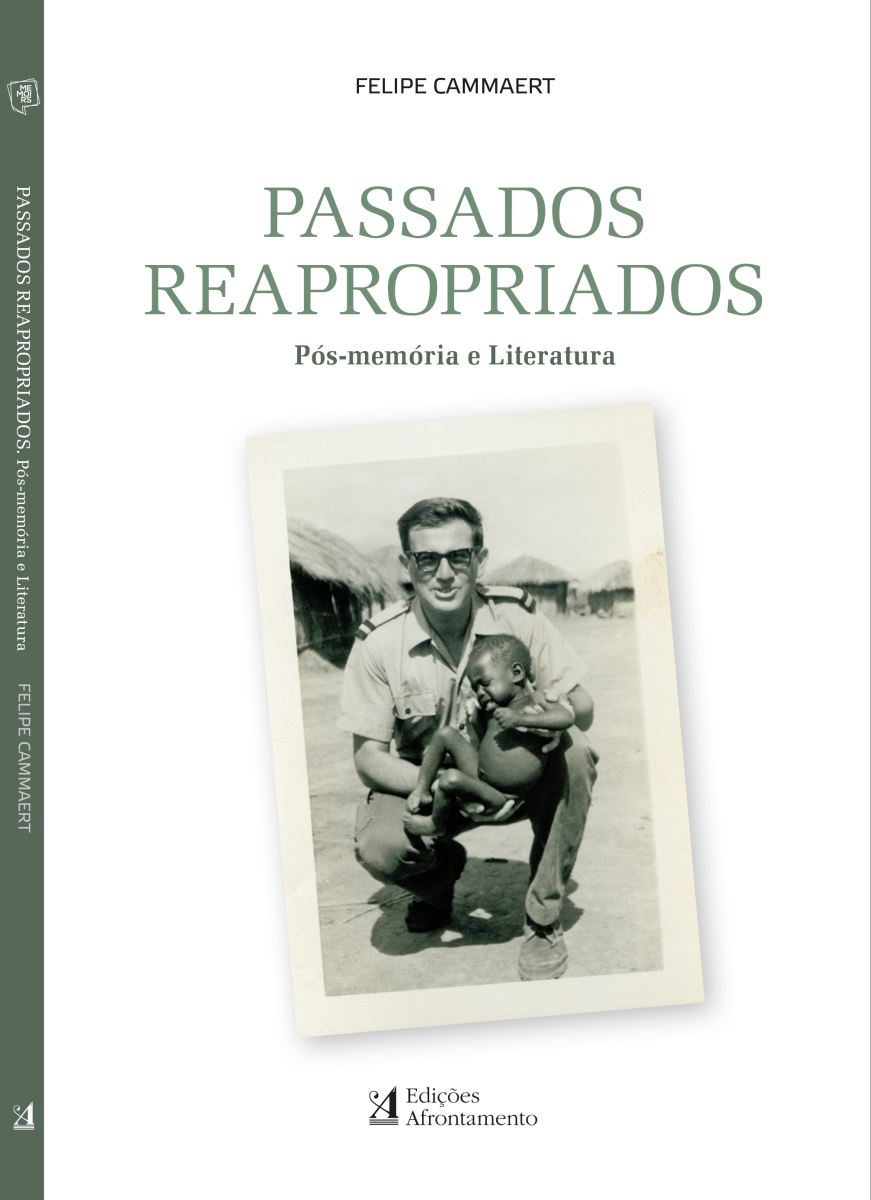
Passados reapropriados: pós-memória e literatura
Felipe Cammaert
2022 | Porto : Edições Afrontamento | Memoirs
Passados reapropriados: pós-memória e literatura (2022) comments on the richness of literary representations of post-memory in the postcolonial context. Based on a selection of writers from Portugal, France and Belgium, studied within the project "MEMOIRS - Children of Empires and European Postmemories", the book is interested in some of the themes common to the writings of these three countries, in particular the issues of the re-enactment of ghosts and colonial myths in these works, as well as the re-appropriation of colonial memories through a new reading of the images and archives of that period. Equally, this essay focuses on the modalities of the configuration of post-memory in literature, and namely on the nature of the connection that the seven selected authors maintain with the past of their respective countries. This book explores the specific situations in which the memory of colonialism is represented, in literature, beyond the existence of a biographical link between the writer's descendant and the family past, thus appealing to a transmission of a cultural type. In sum, Passados reapropriados: pós-memória e literatura intends to show the dynamics and potentialities of the narrative device to represent, in the spatio-temporal reality of fiction, the intergenerational transfers of the European colonial trauma.
Cover image: Mário Faria, medical militia ensign, Mozambique, 1968. © Private archive of Paulo Faria (Courtesy of the writer).
BUY
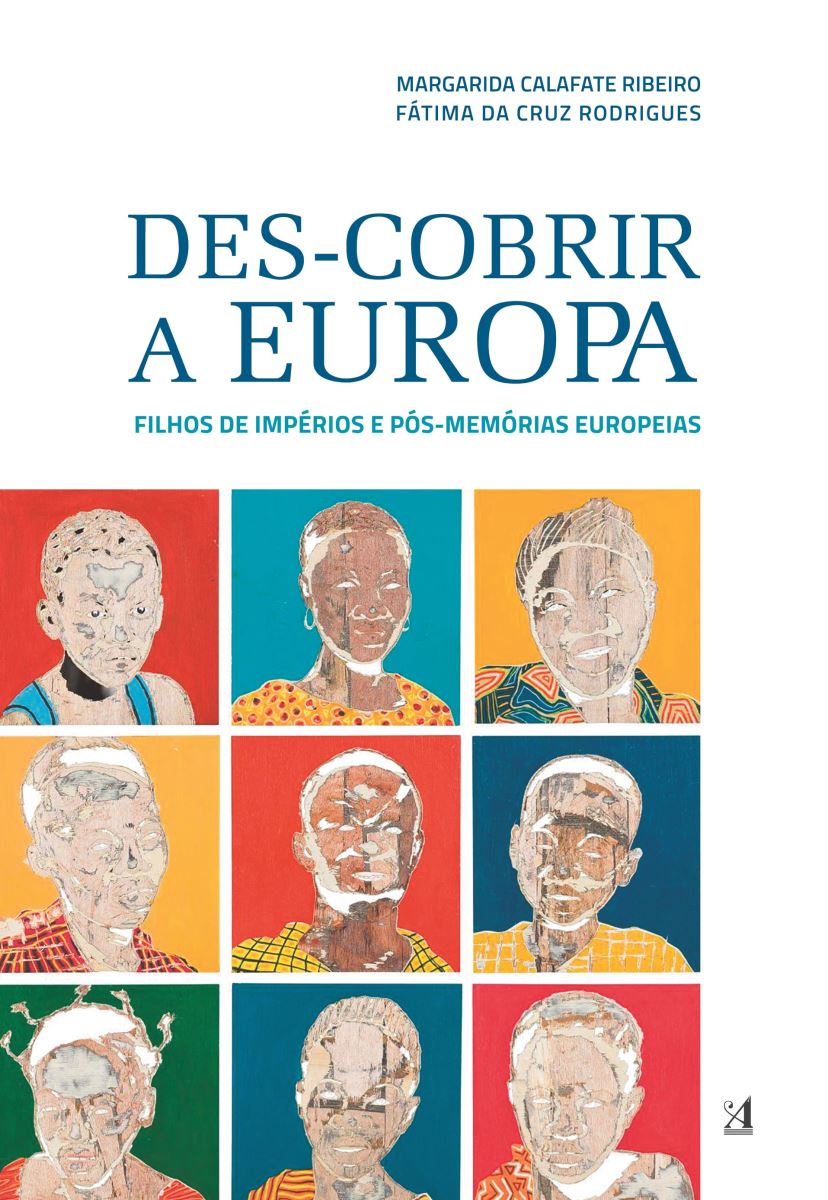
Des-cobrir a Europa. Filhos de Impérios e pós-memórias europeias
Margarida Calafate Ribeiro | Fátima da Cruz Rodrigues
2022 | Porto : Edições Afrontamento | Memoirs
Des-cobrir a Europa – Filhos de Impérios e Pós-memórias Europeias revela-nos as memórias intergeracionais de filhos daqueles que viveram os dias finais do colonialismo e das lutas pela independência de territórios colonizados por Portugal, França e Bélgica. Neste arquivo de pós-memória, ecoam histórias de Angola, Moçambique, Guiné-Bissau, São Tomé e Príncipe, Cabo Verde, Argélia e Congo, através das palavras de trinta e sete cidadãs e cidadãos europeus, cujas narrativas e reflexões interrogam esse passado, as suas sombras e os seus silêncios, mas também exprimem as suas alegrias e realizações, no presente europeu. A partir destes registos pessoais, podemos seguir os fios que ligam as relações coloniais de outrora aos fenómenos contemporâneos das migrações, da nostalgia, do racismo, da discriminação ou da hipocrisia política das relações entre as antigas metrópoles colonizadoras e as antigas colónias. Por isso, são abordadas questões como cidadania, pertença, herança, mas também reparação, restituição e denúncia, gerando uma dialética intergeracional complexa e nova que recusa a prossecução da retraumatização, ao mesmo tempo que rejeita as lógicas do esquecimento. São olhares atentos a outros lados da história, necessariamente subjetivos e plenos de experiências alheias, geradoras de múltiplos laços afetivos, familiares e políticos, que contribuem para iluminar e compreender o presente europeu e as ligações entre Europa e África. A fechar, um texto do escritor português Paulo Faria, que nos desafia para novas constelações de memórias europeias e sugere outras interrogações.
Book cover image: Aimé Mpane (courtesy of the artist)
BUY BOOK REVIEW 01 BOOK REVIEW 02
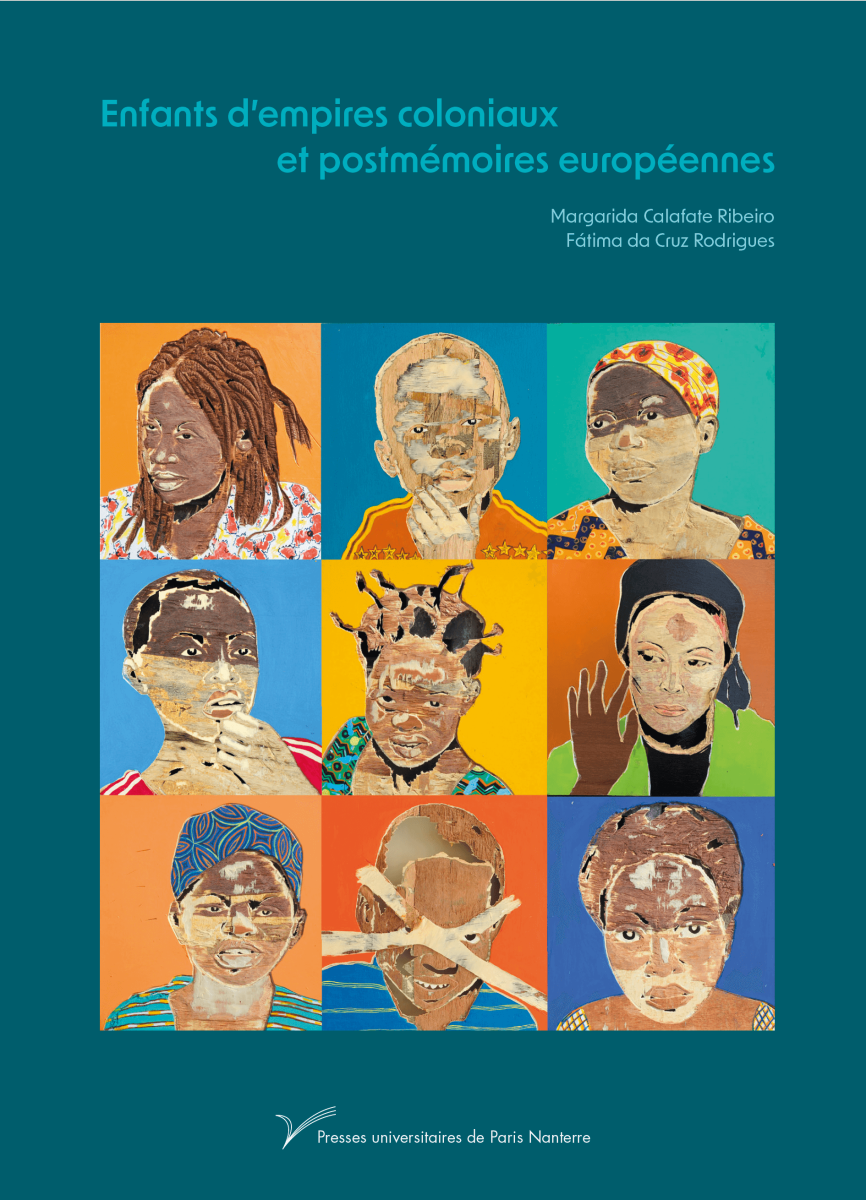
Enfants d'Empires coloniaux et postmémoires européennes
Margarida Calafate Ribeiro | Fátima da Cruz Rodrigues
2022 | Paris : Presses universitaires de Paris Nanterre Collection « La langue portugaise en cultures », 2022.
Enfants d’Empires coloniaux et postmémoires européennes révèle les souvenirs intergénérationnels des enfants de ceux qui ont vécu les derniers jours du colonialisme et les luttes pour l'indépendance dans les territoires colonisés par la Belgique, la France et le Portugal. Dans ce recueil de postmémoires, des récits d’Algérie, du Congo, d'Angola, du Cap-Vert, de Guinée-Bissau, du Mozambique et de São Tomé-et-Príncipe résonnent à travers les mots de trente-sept citoyen(ne)s européen(ne)s, dont les histoires et les réflexions interrogent ce passé, ses ombres et ses silences, mais expriment aussi ses joies et ses accomplissements dans le présent européen. À partir de ces mémoires personnelles, nous pouvons tisser les fils qui associent les relations coloniales du passé aux phénomènes contemporains de migrations, de nostalgie, de racisme, de discrimination ou d'hypocrisie politique des relations entre les anciennes métropoles colonisatrices et les anciennes colonies. Dès lors, des questions telles que la citoyenneté, l'appartenance, l'héritage, mais aussi la réparation, la restitution et la dénonciation sont abordées, produisant une dialectique intergénérationnelle complexe et nouvelle qui refuse de poursuivre la retraumatisation, tout en rejetant les logiques de l'oubli. Ce sont des regards attentifs sur d'autres versants de l'histoire, forcément subjectifs et riches du vécu des autres, générateurs de multiples liens affectifs, familiaux et politiques, qui contribuent à éclairer et à comprendre le présent européen et les liens entre l'Europe et l'Afrique.
Pour finir, un texte de l'écrivain portugais Paulo Faria nous interpelle vers de nouvelles constellations de mémoires européennes et suggère d'autres questions.
Book cover image: Aimé Mpane, 9 Portraits, série Kinoct, 2011, (courtesy of the artist).
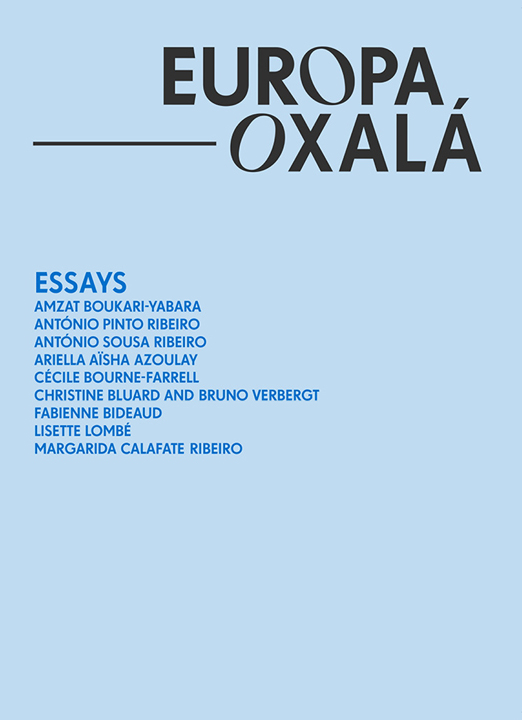
Europa Oxalá - Collection of essays
Various Authors
2021 | : Edições Afrontamento | Memoirs
" Numa cenografia notável concebida por Joris Lipsch e Studio Matters, Europa, Oxalá reúne uma selecção muito interessante de obras de cerca de vinte artistas e intelectuais europeus cujas origens familiares se encontram nas antigas colónias (Congo, Angola, Guiné, Benin, Argélia, Madagáscar...). A relevância das obras seleccionadas, uma exposição subtil e dinâmica e uma cenografia discreta mas muito eficaz dão a Europa, Oxalá um poder espantoso para servir o propósito dos curadores, sem produzir um discurso excessivamente didáctico. Com delicadeza, Europa, Oxalá deixa espaço para a expressão de cada artista e as emoções dos visitantes". [in Cision, 25.11.21]
"Falam crioulo, árabe, wolof ou lingala em casa, francês ou português em público. Alguns estão perto das suas comunidades de origem. Outros distanciaram-se. Estes vinte e um artistas são parte integrante de uma Europa cujos contornos tentam definir na exposição Europa, Oxalá, actualmente em exposição no MuCEM em Marselha.....Originalmente planeada para Tervuren, finalmente começou em Outubro de 2021 em Marselha. Uma cidade que, no final de Novembro, não acolheu Eric Zemmour. Quando o candidato de extrema-direita afirma a intenção de abolir o direito à terra e o direito de asilo, quando Marine Le Pen grita pela "preferência nacional", Europa, Oxalá soa como um hino ao viver em comum". [in Le Monde, 13.1.2022]
Com ensaios de: Amzat Boukari-Yabara, António Pinto Ribeiro, António Sousa Ribeiro, Ariella Aïsha Azoulay, Cécile Bourne-Farrell, Christine Bluard et Bruno Verbegt, Fabienne Bideaud, Lisette Lombé, Margarida Calafate Ribeiro.
Este livro está disponível em português, francês, inglês e neerlandês.
BUY
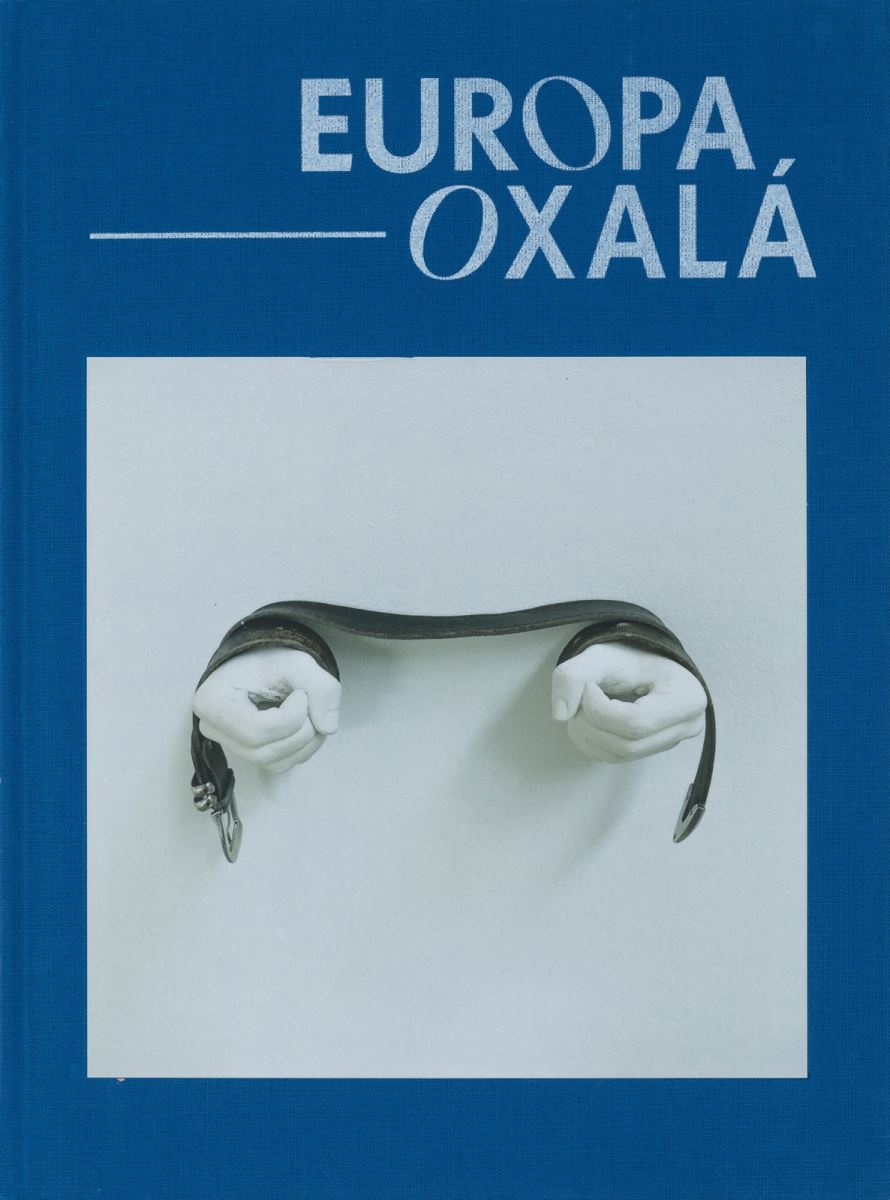
Europa Oxalá - Exhibition catalogue
Vários Autores
2021 | : Edições Afrontamento | Memoirs
EUROPA OXALÁ is an exhibition about the young Europe that is happening now and that wants to be built as a place of an inclusive, diverse, democratic and free future. Children of European empires, the artists and intellectuals who make EUROPA OXALÁ bring to the cultural and artistic scene the colonial heritage that shapes them and that was the starting point for the research and production work that is now being exhibited. Most of these new looks on contemporary Europe are the result of memories transmitted by parents and grandparents who lived in colonial contexts - in the Congo, Angola, Guinea, Mozambique, Benin, Algeria, or Madagascar - whose heirs interrogate or confront other memories, namely public memories.
Artists: Aimé Mpane, Aimé Ntakiyica, Carlos Bunga, Délio Jasse, Djamel Kokene-Dorléans, Fayçal Baghriche, Francisco Vidal, Josèfa Ntjam, Katia Kameli, Malala Andrialavidrazana, Márcio Carvalho, Mohamed Bourouissa, Mónica de Miranda, Nú Barreto, Pauliana Valente Pimentel, Pedro A.H. Paixão, Roland Gunst [John K. Cobra], Sabrina Belouaar, Sammy Baloji, Sandra Mujinga, Sara Sadik.
Book cover image: Sabrina Belouaar, Dada, 2018, (courtesy of Mohamed Bourouissa).
BUY BOOK REVIEW
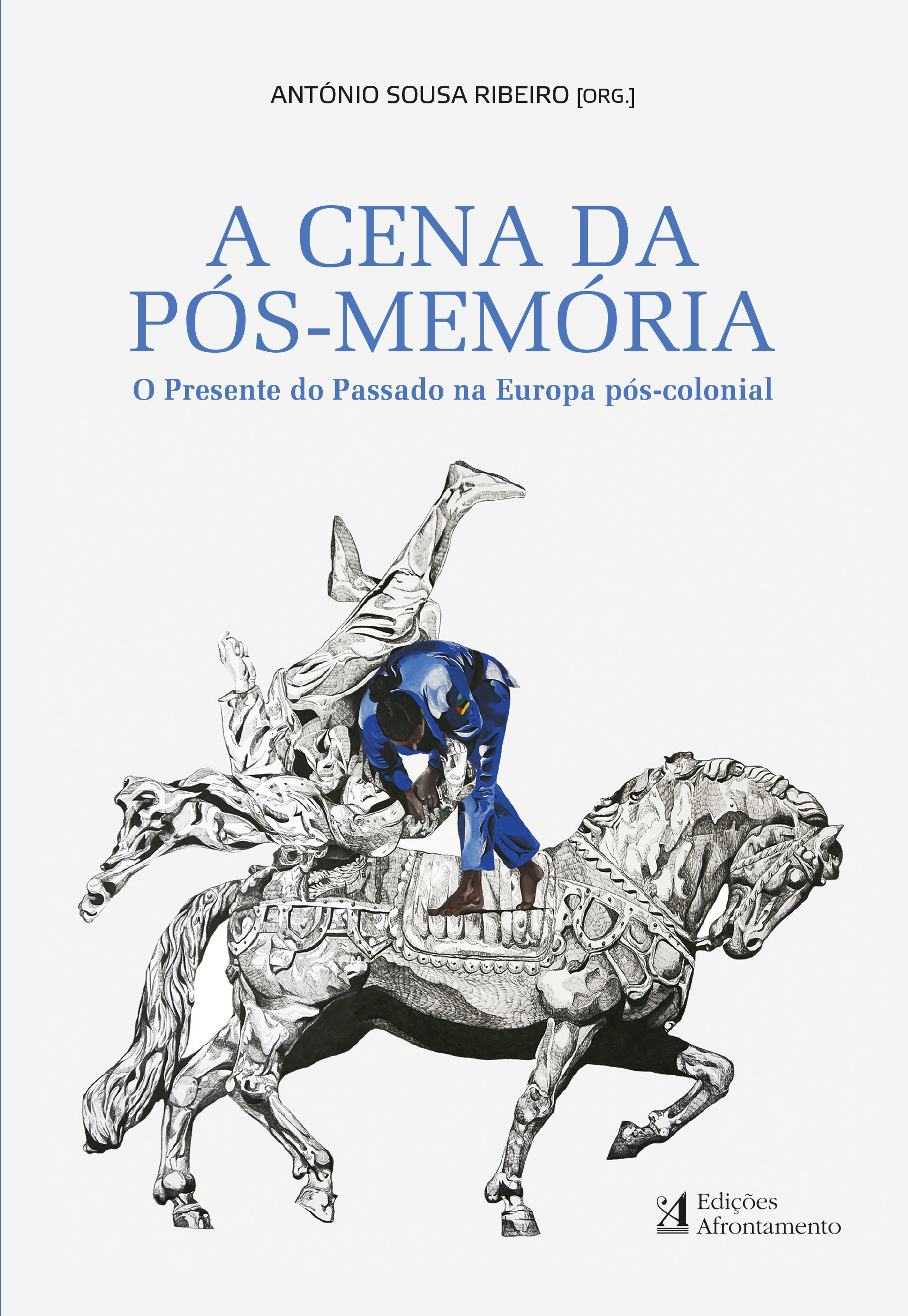
A cena da pós-memória. O presente do passado na Europa pós-colonial
António Sousa Ribeiro
2021 | Porto : Edições Afrontamento | Memoirs
A cena da pós-memória. O presente do passado na Europa pós-colonial reúne um conjunto de contributos da autoria de investigadores e investigadoras associados/as ao projeto MEMOIRS - Filhos de Império e Pós-Memórias Europeias, traçando uma primeira cartografia global dos temas que nortearam este projeto. As duas partes em que a obra se divide representam as duas vertentes essenciais da investigação produzida: por um lado, em íntima ligação com o enquadramento teórico dos casos em análise, um processo de clarificação concetual tendente a precisar os contornos, desde logo, do próprio conceito de pós-memória, mas, igualmente, de um conjunto de noções diretamente relevantes para uma caracterização articulada das principais linhas de força que estruturam o campo das memórias pós-coloniais; por outro lado, a investigação empírica, baseada em vasta pesquisa documental agregada numa extensa base de dados que ficará livremente acessível, mas estruturada, igualmente, a partir de um grande número de entrevistas realizadas nos três países em análise: Portugal, França e Bélgica.
Com textos de: António Pinto Ribeiro, António Sousa Ribeiro, Bruno Sena Martins, Ettore Finazzi-Agrò, Fátima da Cruz Rodrigues, Felipe Cammaert, Fernanda Vilar, Graça dos Santos, Margarida Calafate Ribeiro, Paulo de Medeiros e Roberto Vecchi.
Cover image: Márcio Carvalho, "Falling Thrones, Statue: King D. João I, Athlete: Josina Muthemba Machel", 2019, (Micro pigmented ink and acrylic on paper, 160 X 150 cm) (courtesy of the artist).
BUY BOOK REVIEW
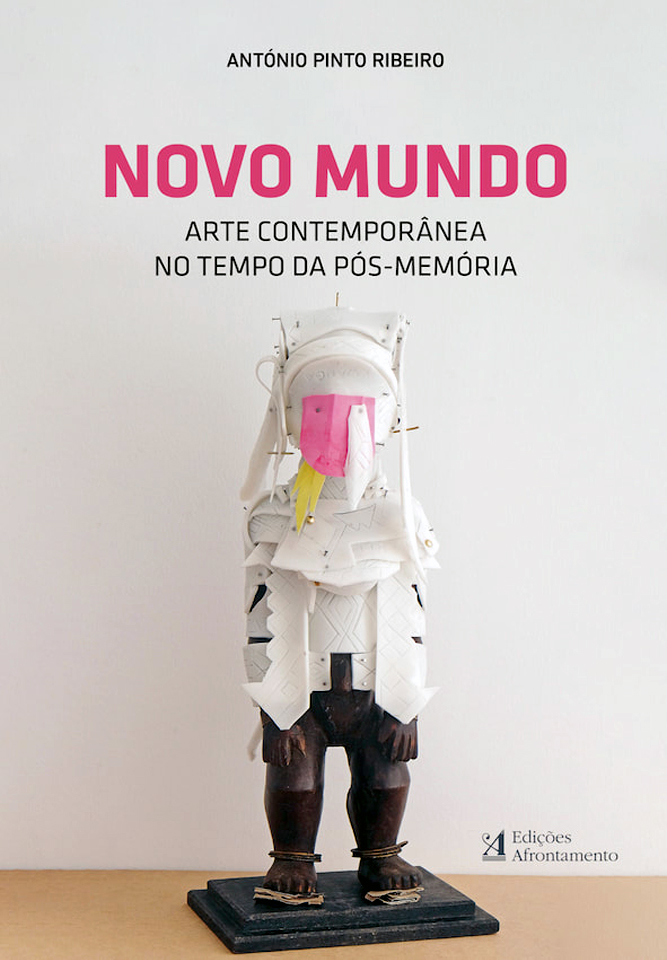
Novo Mundo - Arte Contemporânea no Tempo da Pós-Memória
António Pinto Ribeiro
2021 | Porto : Edições Afrontamento| Memoirs
| Novo Mundo – Arte Contemporânea no Tempo da Pós-Memória (2021) is a book about works and about artists who practice different artistic languages and genres - from cinema to music, from visual arts to theatre, dance and photography. They have in common memories that were transmitted to them by their parents and grandparents of African origin, memories that are deferred and appropriated according to each one and that, today, constitute part of the material of their works. For this reason, they are called artists in the condition of post-memory. Currently, they comprise two generations of artists who star in much of what is pertinent, daring, expressive and critical in contemporary European arts. Due to the nature of their works, these artists are bearers of a gift that is as innovative as it is urgent and their transnational and transterritorial presence carries with them a combative energy in the face of the legacy of colonialism and racism, as well as clamoring for the urgency of decolonization of the canons and for need for a rewriting of the histories of Africa and Europe, and not just the History of Art. Cover image: John K. Cobra, Untitled, 2019 (mixed media, wood, silicone, metal) (courtesy of the artist). BUY BOOK REVIEW |
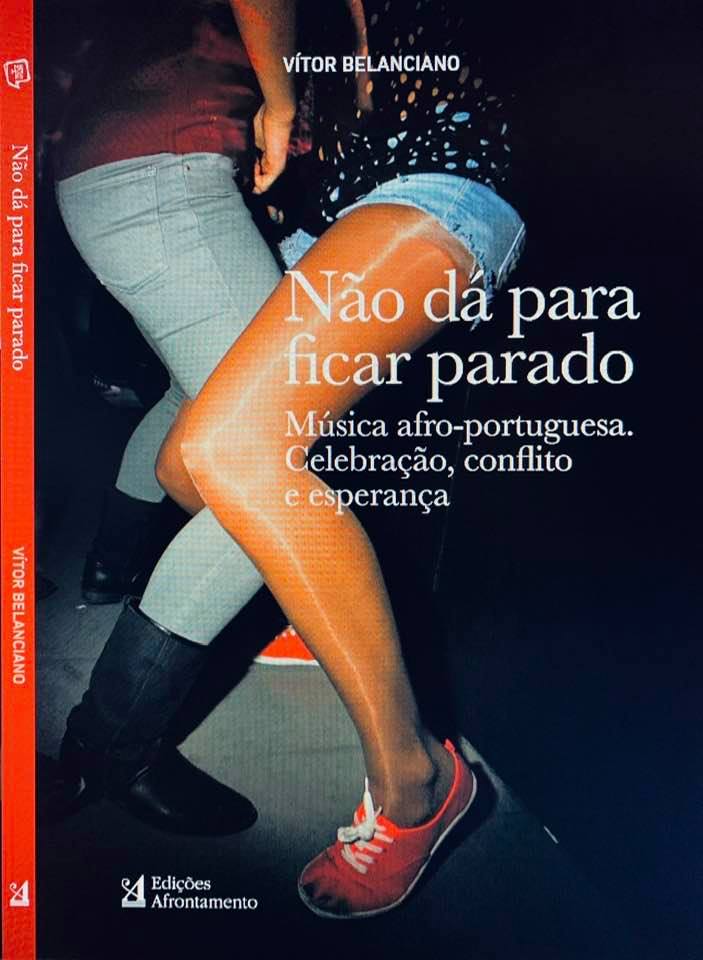
Não dá para ficar parado. Música afro-portuguesa - celebração, conflito e esperança
Vítor Belanciano
2020 | Porto : Edições Afrontamento| Memoirs
| We all know. There was a political decolonization in Portugal. But the decolonization of mentalities is still missing. One of the perspectives allowing to reflect upon and question this issue is the one of popular music. This is a territory where both the conflictualities and the ambiguities, or potentialities, of postcolonialism are particularly reflected. The richness of bringing things together, namely as a way of affirmation for Europe, is valued, but chronologies of tension are perpetuated as well. Which does not imply that music is not a fascinating place of social experimentation, generating visibilities, stimulating discourses encompassing different urgent issues. This is a history constructed by numerous authors of the second and third generations of afro-descendants, from General D to DJ Marfox or Dino d'Santiago, who have proved able, in the last two decades, to displace certainties, carrying along new experiences, practising music for dancing, thinking and acting. To stand still is no option.
|
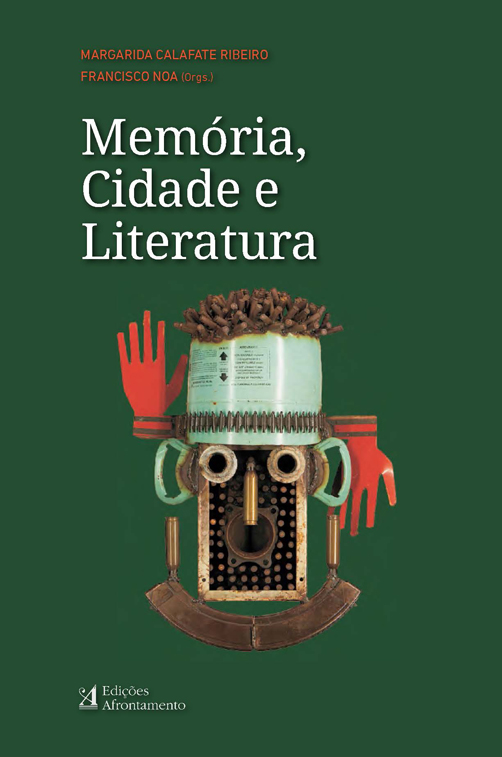
Memória, Cidade e Literatura: De São Paulo de Assunção de Loanda a Luuanda, de Lourenço Marques a Maputo
Margarida Calafate Ribeiro e Francisco Noa (org.)
2019 | Porto : Edições Afrontamento| Memoirs
Every city contains its history. Luanda and Maputo are no different. Luanda, facing the Atlantic, reveals Western influence in its Luso-Brazilian architecture. Maputo, facing the Indian Ocean, boasts the mix of Africa, Portugal an Asia. The world of these cities is particularly mixed: pluralities and diversities that involve beings, objects, temporalities and spaces are intertwined. The archaic occurs with the modern; progress with backwardness. Political moments crash into one another. All stake claims to historical attention: the precolonial era, coastal settlement, modern colonialism, independence, postcolonialism, post-war and actuality.
Authors: António Pinto Ribeiro, Francisco Noa, Margarida Calafate Ribeiro, Nazir Ahmed Can, Nuno Simão Gonçalves, Phillip Rothwell, Rita Chaves, Roberto Vecchi, Sandra Inês Cruz, Tania Macêdo
Book cover image: Gonçalo Mabunda, «O Homem-Reflexo», 2017 (welding with weapons and metals deactivated) (Courtesy of Jack Ball Gallery).
BUY INDEX
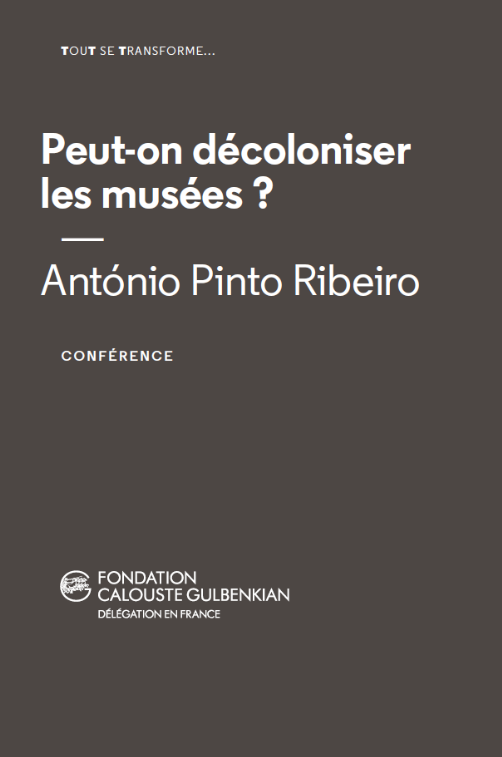
Peut-on Décoloniser les Musées?
António Pinto Ribeiro
2019 | Paris : Fundação Calouste Gulbenkian - Delegação em França
A partir des années 60, le “déseurocentrisme” de la production de la connaissance et la révision des canons et des épistémologies initiées avec les Etudes culturelles auxquelles ont succédé les différents post-colonialismes et les études de genre ont provoqué une révolution que l’on ne peut que comparer à la révolution copernicienne. C’est dans ce contexte que l’épistémologie et la muséographie se sont déplacées pour comprendre que les musées, n’étant pas seulement des collections mais fondamentalement des dispositifs narratifs, se confrontent au fait de devoir être postcoloniaux. Cette situation nous oblige à revoir les narrations et, au moins, à incorporer les tensions entre les anciennes et les nouvelles histoires, à réfléchir sur la forme dont ces collections et ces butins sont arrivés dans les musées européens et nord-américains et, enfin, à redéfinir le concept de musée à la lumière du “panafricanisme” et de la “pensée amérindienne”.
BUY PODCAST BOOK REVIEW SPANISH
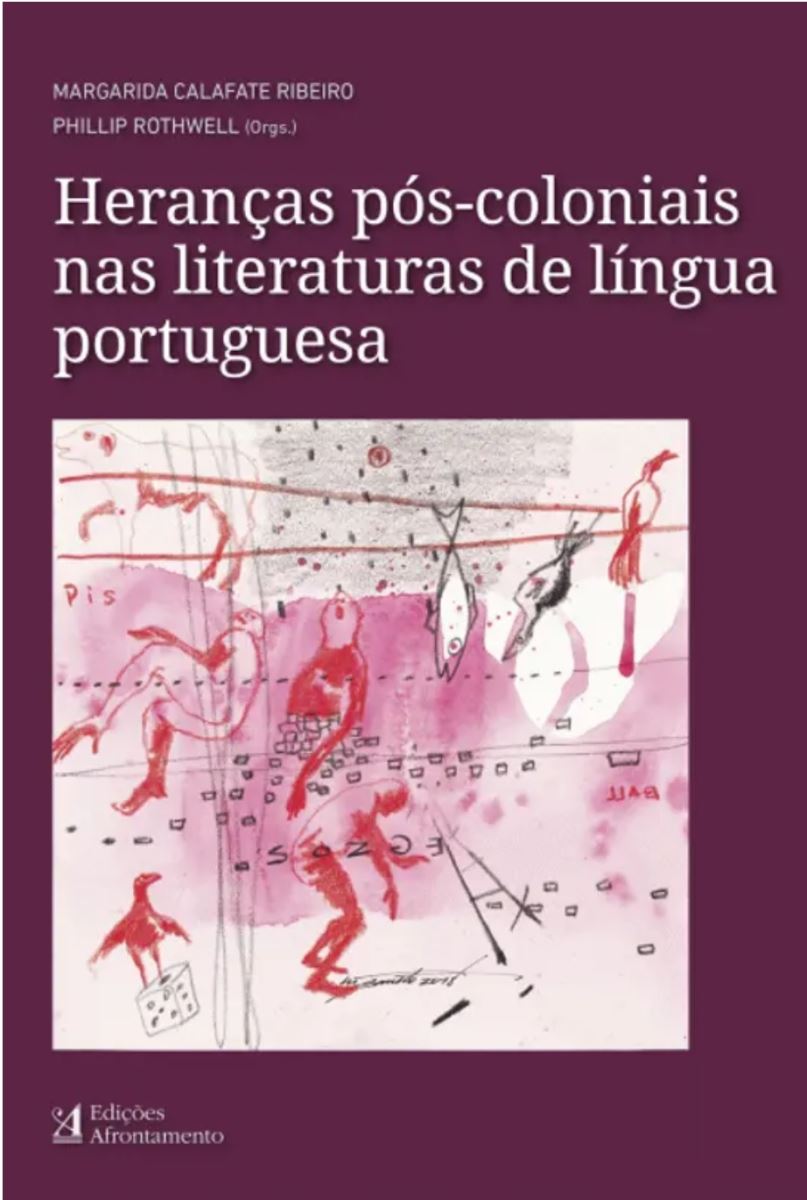
Heranças Pós-Coloniais nas Literaturas de Língua Portuguesa
Margarida Calafate Ribeiro e Phillip Rothwell (org.)
2019 | Porto : Edições Afrontamento| Memoirs
A timely and ambitious project, this volume brings together a broad array of essays, highlighting the latest critical trends in African Literatures written in Portuguese, broadly interpreted to include work by descendants of Africa in Europe. It begins by mapping out these literatures in short, yet wide-ranging, essays. It then focuses on recurrent themes and key authors, before analysing literary transitions into the postnational, including a focus on diasporas.
Essays by: Inocência Mata, Francisco Noa, Tania Macêdo, Ana Cordeiro, Moema Parente Augel, Carmen Lucia Tindó Ribeiro Secco, Rita Chaves, Sílvio Renato Jorge, Dorothée Boulanger, José Luís Pires Laranjeira, Inês Nascimento Rodrigues, Sandra Inês Cruz, Alexandra Reza, Nazir Ahmed Can, Vincenzo Russo, Raquel Ribeiro, Roberto Vecchi, Fernanda Vilar, Margarida Calafate Ribeiro, Felipe Cammaert, Phillip Rothwell, and António Pinto Ribeiro.
Book cover image: Nu Barreto, untitled, 2018 (courtesy of the artist and Galerie Nathalie Obadia, Paris)
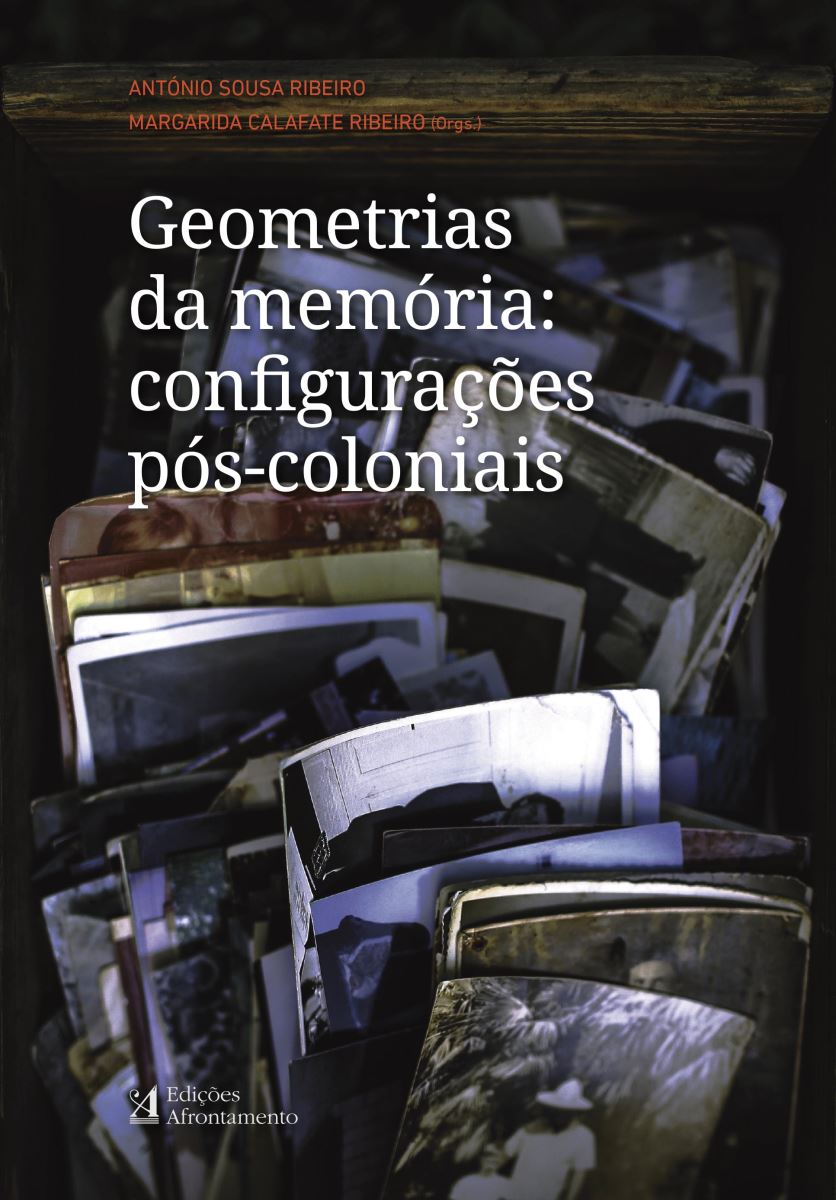
Geometrias da Memória: configurações pós-coloniais
António Sousa Ribeiro e Margarida Calafate Ribeiro (org.)
2016 | Porto : Edições Afrontamento| Memoirs
In the contemporary discussion on postcolonial situations, the dimension of memory and postmemory has acquired increased relevance. Geometrias da memória: configurações pós-coloniais is the first volume in the series “Memoirs – Children of Empires”, the result of a partnership between the Afrontamento publishing house and the research project “Memoirs: Children of Empire and European Postmemories” of the Centre for Social Studies of the University of Coimbra, funded by the European Research Council (ERC, Consolidator Grant).
Essays by Ana Paula Ferreira, António Pinto Ribeiro, António Sousa Ribeiro, Bruno Sena Martins, Catarina Martins, Fabrice Schurmans, Francisco Noa, Helder Macedo, Isabel Castro Henriques, João Paulo Borges Coelho, Júlia Garraio, Laura Padilha, Margarida Calafate Ribeiro, Miguel Bandeira Jerónimo, Paulo de Medeiros, Roberto Vecchi.
Cover image: Creative Commons, «Old photos in a wooden box», 2016, (CC0)


